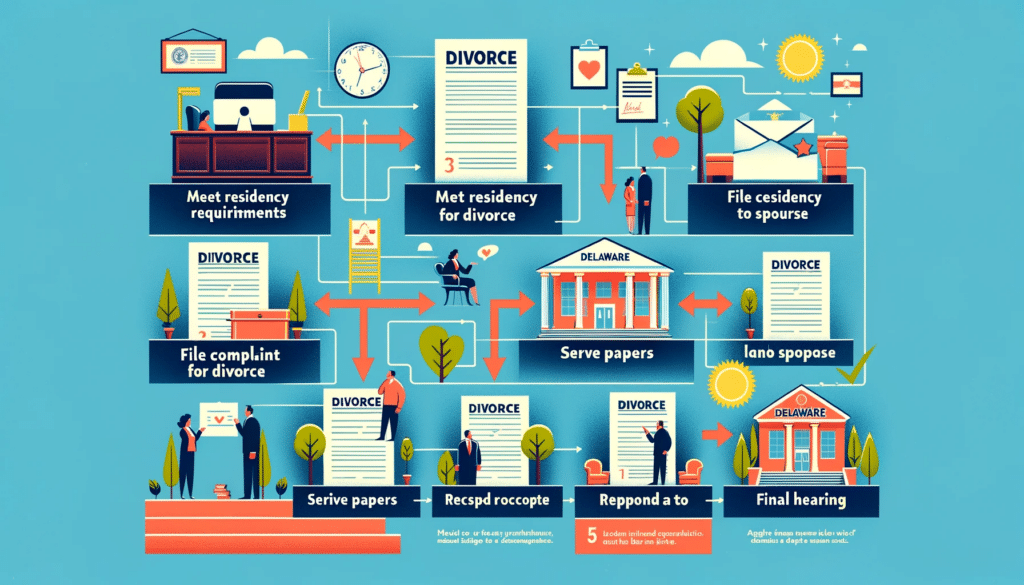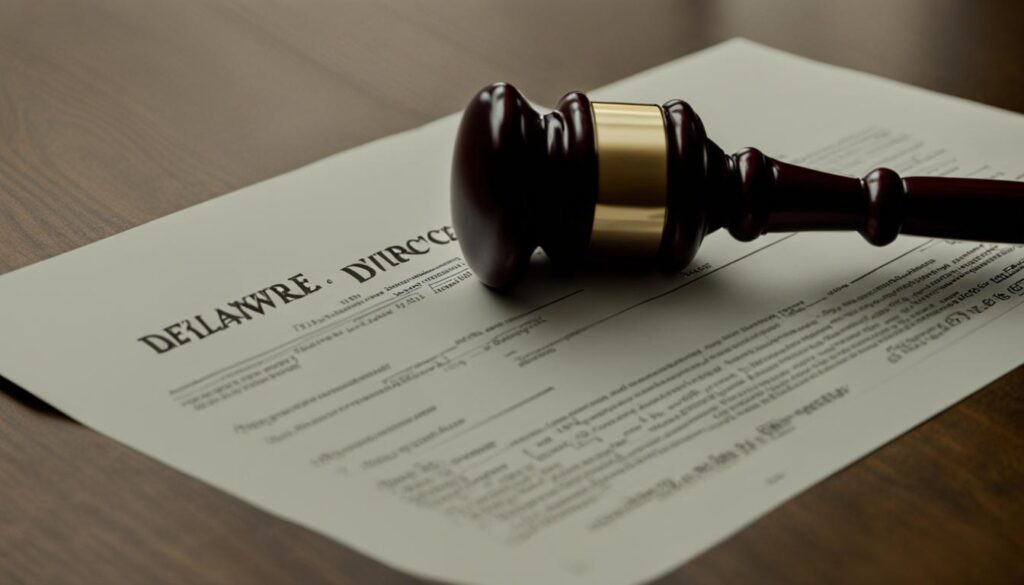Physical Address
304 North Cardinal St.
Dorchester Center, MA 02124
Physical Address
304 North Cardinal St.
Dorchester Center, MA 02124

Filing for divorce in Delaware might feel like crossing a bridge into unknown territory. It’s not just about legal procedures; it’s a personal transition too. Delaware’s divorce process has its own set of rules and nuances, each playing a vital role in your journey.
From residency requirements to the intricacies of legal paperwork, navigating this path can be daunting. But, there’s a way through this labyrinth. This article will be your guide, helping you understand Delaware’s unique divorce laws.

We’ll delve into the legal complexities and the emotional landscape of this process. Are you ready to take the first step towards a new beginning in Delaware? Keep reading to embark on this pivotal journey with confidence.
For more on how to file for divorce, check out our article, How to File for Divorce: A Concise Guide for Couples.
If you are considering filing for divorce in Delaware, you have to be sure to meet the residency requirements.
To be eligible to file for divorce in Delaware, at least one spouse must have been a resident of the state for a continuous period of at least six months.
This means that either you or your spouse must have lived in Delaware for the required time before initiating the divorce process.
These residency requirements ensure that the divorce petition is filed in the appropriate jurisdiction. The Delaware Family Court in the county where either spouse resides is the designated court where divorce petitions must be filed. By establishing residency in Delaware, you ensure that your divorce case is handled by the appropriate court.
If you or your spouse is a member of the armed forces stationed in Delaware, additional criteria apply. The military spouse must have been stationed in Delaware for six months before filing for divorce in the state.
| Residency Requirements for Divorce in Delaware: | Criteria |
|---|---|
| Length of Residency | At least six months of continuous residency for one spouse |
| Court Jurisdiction | Delaware Family Court in the county where either spouse resides |
| Military Spouse | Must have been stationed in Delaware for six months before filing |
One key thing about filing for divorce in Delaware is to know where to file your paperwork. In Delaware, divorce petitions must be filed in the Delaware Family Court located in the county where either the petitioner or respondent resides.
This means that you can file for divorce in the county where you currently live or in the county where your spouse resides. You must file in the correct county to ensure that your case is handled by the appropriate court.
The Delaware Family Court is responsible for handling all divorce cases in the state. This court specializes in family law matters, including divorce, child custody, and support. When filing for divorce, you will need to submit the necessary paperwork to the court clerk of the Delaware Family Court. The court clerk will review your documents and provide you with instructions on the next steps in the divorce process.
Filing for divorce in the Delaware Family Court ensures that your case will be heard by judges who are experienced in family law matters. These judges have knowledge of the specific divorce laws and procedures in Delaware, which can help ensure that your case is handled fairly and efficiently.
The Delaware Family Court also offers resources and support services to help parties navigate the divorce process, including mediation and counseling services.
| Delaware Family Court | Contact Information | Website |
|---|---|---|
| New Castle County | (302) 255-0300 | Visit Website |
| Kent County | (302) 735-1900 | Visit Website |
| Sussex County | (302) 855-7400 | Visit Website |
Each county has its own Delaware Family Court, so you will need to contact the court in the specific county where you plan to file for divorce. The contact information and website links for each county’s Family Court are provided in the table above for your convenience.

Let’s now touch on the grounds for divorce.
Delaware allows for both no-fault and fault-based grounds.
No-fault grounds for divorce include voluntary separation and separation due to incompatibility. These no-fault grounds require a six-month separation period.
On the other hand, fault-based grounds include separation due to misconduct or mental illness. Fault-based grounds may require providing evidence to support the claims.
When filing for divorce, you need to determine the appropriate grounds based on your situation. Understanding the grounds for divorce in Delaware will help you navigate the legal process and ensure that you meet the necessary requirements.
1. Voluntary separation: This ground can be established if both spouses have voluntarily lived separate and apart without cohabitation for a continuous period of six months or more.
2. Separation due to incompatibility: This ground can be established if both spouses have been living separately and apart without cohabitation for a continuous period of six months or more, and there is no reasonable prospect of reconciliation.
3. Separation due to misconduct: This ground can be established if one spouse has engaged in misconduct such as adultery or cruel treatment towards the other spouse.
4. Separation due to mental illness: This ground can be established if one spouse has been confined to a mental institution for a period of at least three years and there is no reasonable expectation of recovery.
To file for divorce in Delaware, there are several steps you need to follow. Here is a breakdown of the process:
Before filing for divorce, gather all necessary information and documents. This includes financial records, assets, debts, and any evidence that supports your grounds for divorce.
To initiate the divorce process, one spouse must prepare a petition for divorce and other required documents. This includes completing forms such as a complaint for divorce, a verification form, and any additional forms specified by the Delaware Family Court.
When filling out the forms, make sure to provide accurate and detailed information. Double-check all the information and review the forms before submitting them to the Delaware Family Court. Small errors could cause delays in the divorce process.
After completing the necessary documents, you will need to file them with the court clerk at the Delaware Family Court. Along with the forms, you will also need to pay the filing fee, which is currently $165.
After filing for divorce, the petitioner must serve their spouse with the divorce papers. In Delaware, the court clerk will prepare a summons and send it to the county sheriff for service. The spouse then has 20 days to respond to the petition.
| Step | Description |
|---|---|
| 1 | Gather all necessary information and documents. |
| 2 | Prepare the petition for divorce and other required forms. |
| 3 | File the forms and pay the filing fee at the Delaware Family Court. |
| 4 | Ensure the spouse is served with the divorce papers. |
| 5 | Wait for the spouse’s response within 20 days. |
Divorce can be a complex and emotional process, so it is recommended to seek legal advice or use online divorce services for assistance with completing and filing the necessary forms. With proper preparation and understanding of the process, you can navigate the divorce process in Delaware smoothly.

When filing for an uncontested divorce in Delaware, the process can be relatively straightforward. Here’s a step-by-step guide to help you navigate through:
Start by gathering all relevant information about your marital assets, debts, and financial situation. This will help ensure a smooth and fair division of assets during the divorce process.
To initiate the uncontested divorce process, you’ll need to prepare the necessary forms. These include a petition for divorce, an information sheet, a vital statistics certificate of divorce, and an affidavit of children’s rights if you have minor children.
Once you have completed the required forms, file them with the court clerk of the county where either you or your spouse resides. Remember to bring multiple copies of the forms to be filed.
When filling out the forms, carefully provide accurate and detailed information. Pay close attention to any instructions or specific requirements outlined in the forms, as errors or omissions may delay the divorce process.
After completing the forms, submit them to the court clerk along with the necessary filing fee, which is currently $165. Keep copies of all filed documents for your records.
Once the forms are filed, you must serve your spouse with a copy of the divorce papers. In Delaware, the court clerk will prepare a summons and send it to the county sheriff for service. Your spouse will then have 20 days to respond to the petition.
If your spouse agrees to the terms stated in the divorce petition, they can file an answer or affidavit of appearance and waiver of rights within the 20-day timeframe. Failure to respond may result in a default judgment.
Both parties in an uncontested divorce must disclose their financial information, including income, assets, debts, and expenses. It is important to provide accurate and thorough financial disclosures to ensure a fair division of assets.
In Delaware, it is possible to file for an uncontested divorce without an attorney. However, it is recommended to seek legal advice or use online divorce services to ensure all necessary forms are completed correctly and to avoid any potential pitfalls.
Once you have filed for divorce in Delaware, you have to serve your spouse with the necessary divorce papers. The serving process ensures that your spouse is officially notified of the divorce proceedings and has an opportunity to respond.
In Delaware, the court clerk will prepare a summons and send it to the county sheriff for service. The sheriff will then serve the papers to your spouse.
After being served, your spouse has 20 days to respond to the petition.
They can either file an answer or submit an affidavit of appearance and waiver of rights. Keep track of important deadlines and ensure that your spouse is properly served so that the divorce proceedings can move forward.
| Step | Description |
|---|---|
| 1 | File for divorce in Delaware |
| 2 | Court clerk prepares summons |
| 3 | Summons sent to county sheriff for service |
| 4 | Sheriff serves divorce papers to spouse |
| 5 | Spouse has 20 days to respond |
By following the proper steps to serve your spouse in Delaware, you can ensure that the divorce proceedings proceed smoothly and efficiently.
Keep in mind that serving divorce papers can be a sensitive and emotional process. If you require additional support or resources, consider reaching out to local divorce support groups or seeking guidance from a therapist specializing in divorce-related issues.

Once you have been served with a divorce petition in Delaware, you have to respond within the specified timeframe, which is typically 20 days.
Responding to the petition allows you to have a say in the divorce proceedings and ensures that your rights and interests are protected. The response can be in the form of an answer or an affidavit of appearance and waiver of rights.
If you fail to respond within the given timeframe, the court may enter a default judgment, meaning that the divorce can proceed without your input. Be sure to take action and submit your response to avoid any unfavorable outcomes.
To file a response, you will need to complete the necessary forms provided by the court.
These forms typically include an Answer, where you can either admit or deny the allegations made in the petition, or an affidavit of appearance and waiver of rights, where you acknowledge receipt of the petition and waive your right to further notice or participation in the divorce proceedings.
Once you have filled out the appropriate form, make sure to sign and date it. Keep a copy of the response for your records.
After completing the response form, you must file it with the court clerk in the county where the divorce petition was filed. You may need to pay a filing fee, which can vary depending on the county.
| Step | Action |
|---|---|
| 1 | Complete the appropriate response form (answer or affidavit of appearance and waiver of rights). |
| 2 | Sign and date the form. |
| 3 | Make a copy of the completed form for your records. |
| 4 | File the original form with the court clerk in the county where the divorce petition was filed. |
| 5 | Possibly pay a filing fee, depending on the county. |
By responding to the divorce petition, you are actively participating in the legal process and ensuring that your rights and interests are considered. Consult with an attorney or seek legal advice to ensure that you are taking the appropriate steps and protecting your rights throughout the divorce proceedings.
In a divorce case in Delaware, both parties are required to provide financial disclosures. This means you’ll need to disclose your income, assets, debts, and expenses to ensure a fair division of property and financial obligations.
Financial disclosures are essential for the court to make informed decisions regarding alimony, child support, and the division of marital assets. Be thorough and accurate when presenting your financial information to the court.
If you’re considering filing for divorce in Delaware without an attorney, take the time to understand the complexities involved. While it’s possible to navigate the process on your own, seeking legal advice or using online divorce services can be highly beneficial.
These resources can provide guidance on completing the necessary forms, ensuring all requirements are met, and helping you understand the implications of your decisions. A divorce attorney can also offer valuable insights and protect your interests throughout the proceedings.
Before filing for divorce without an attorney in Delaware, take the time to educate yourself on the divorce process and the specific requirements of your case. Make sure you understand the eligibility criteria, grounds for divorce, and the necessary steps involved in preparing, filing, and serving the required forms.
Being well-informed will help you navigate the process with confidence and make informed decisions regarding your financial disclosures.
In conclusion, filing for divorce in Delaware involves a clear set of procedures that must be carefully followed. Take the time to understand the residency requirements, grounds for divorce, and the necessary legal paperwork.
While the process can be straightforward for uncontested divorces, contested cases may require more extensive legal involvement. Regardless of the specifics, it is always advisable to seek legal counsel to ensure that all aspects of the divorce are handled properly and that your rights are protected.
Remember, divorce is not only a legal process but also an emotional journey, so consider seeking support services as needed. By approaching this process with the right information and support, you can navigate your way to a new beginning.
To see how this process of filing for divorce in Delaware compares to that in other states, check out our articles about how to file for divorce in Maryland and filing for divorce in New Jersey.
In order to file for divorce in Delaware, one spouse must have been a resident of the state for at least six months. If one spouse is a member of the armed forces stationed in Delaware, they must have been stationed in the state for six months before filing.
Divorce petitions in Delaware must be filed in the Delaware Family Court located in the county where either the petitioner or respondent resides.
Delaware allows for both no-fault and fault-based grounds for divorce. No-fault grounds include voluntary separation and separation due to incompatibility. Fault-based grounds include separation due to misconduct or mental illness.
To file for divorce in Delaware, one spouse must prepare a petition for divorce and other required documents. Uncontested divorces occur when both spouses agree on all divorce-related matters, while contested divorces involve disagreements that must be resolved by the court. Filing fees for divorce in Delaware are $165.
To file an uncontested divorce in Delaware, one must prepare a petition for divorce and attach necessary forms such as an information sheet, vital statistics certificate of divorce, and affidavit of children’s rights if there are minor children involved. These documents must be filed with the court clerk of the county where either spouse resides.
The procedures and paperwork for filing a contested divorce in Delaware are similar to those for filing an uncontested divorce. However, contested divorces require a court hearing to resolve any disagreements between the spouses.
The filing fee for a divorce in Delaware is $165. However, individuals who cannot afford to pay the filing fee may request a fee waiver from the court.
After filing for divorce, the petitioner must serve their spouse with the divorce papers. In Delaware, the court clerk will prepare a summons and send it to the county sheriff for service. The spouse has 20 days to respond to the petition.
The responding spouse has 20 days to file an answer or affidavit of appearance and waiver of rights. If the responding spouse does not respond within this timeframe, the court may enter a default judgment.
In Delaware, both parties in a divorce are required to disclose their financial information. This includes income, assets, debts, and expenses. Individuals can file for divorce without an attorney, but it is recommended to seek legal advice or use online divorce services for assistance with completing and filing the necessary forms.